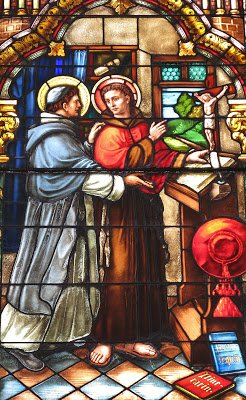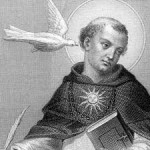 It is always interesting, when reading the lives of the saints, to discover that different saints’ lives often intertwined. It’s as if one were attending class in a schoolroom and sitting next to you was St. Catherine of Siena and in front of you was St. Ignatius of Loyola. Of course, there is the other moment in history when Poland had in their midst St. Maximilian Kolbe, St. Faustina and Bl. Pope John Paul II and yet they did not personally know one another!
It is always interesting, when reading the lives of the saints, to discover that different saints’ lives often intertwined. It’s as if one were attending class in a schoolroom and sitting next to you was St. Catherine of Siena and in front of you was St. Ignatius of Loyola. Of course, there is the other moment in history when Poland had in their midst St. Maximilian Kolbe, St. Faustina and Bl. Pope John Paul II and yet they did not personally know one another!
Today, we celebrate the great saint Bonaventure, Cardinal-Bishop and Minister General of the Franciscan Order, Doctor of the Church known as the Seraphic Doctor who, with St. Thomas Aquinas, studied in Paris. Born in c. 1218, Bonaventure was given the name John. When he was 4 years old, according to tradition, his mother threw herself at the feet of St. Francis of Assisi begging that her son John be delivered from a serious illness. He was cured and St. Francis, foreseeing the “Divine graces” in store for the child cried out ,”O buona ventura!” (Good Fortune!).
At age 22, Bonaventure entered the Order of St. Francis. Sent to Paris to study, he was asked by St. Thomas Aquinas where he had acquired his knowledge. St. Bonaventure pointed to the crucifix and said: “This is the source of all my knowledge. I study only Jesus Christ and Him crucified.”
While attending the Council of Lyons in 1274, St. Bonaventure took ill and died on July 14th. Amazingly enough, St. Thomas Aquinas died en route to the same council. The humble Franciscan who rose to the highest ranks of the Church and the celebrated Dominican who said at the end of his life, “All that I have written seems like straw compared to what has now been revealed to me,” were like bookends in a glorious chapter of the Church.
Pope Benedict XVI (March 17, 2010) describes the two Doctor’s definition of the ultimate goal of mankind:
St Thomas and St Bonaventure define the human being’s final goal, his complete happiness in different ways. For St Thomas the supreme end, to which our desire is directed is: to see God. In this simple act of seeing God all problems are solved: we are happy, nothing else is necessary.
Instead, for St Bonaventure the ultimate destiny of the human being is to love God, to encounter Him and to be united in His and our love. For him this is the most satisfactory definition of our happiness.
In the words of St. Bonaventure, “Let us therefore say to the Lord Our God: ‘Lead me forth, Lord, in Thy way, and let me step in Thy truth; let my heart be glad, that it fears Thy name.'”
